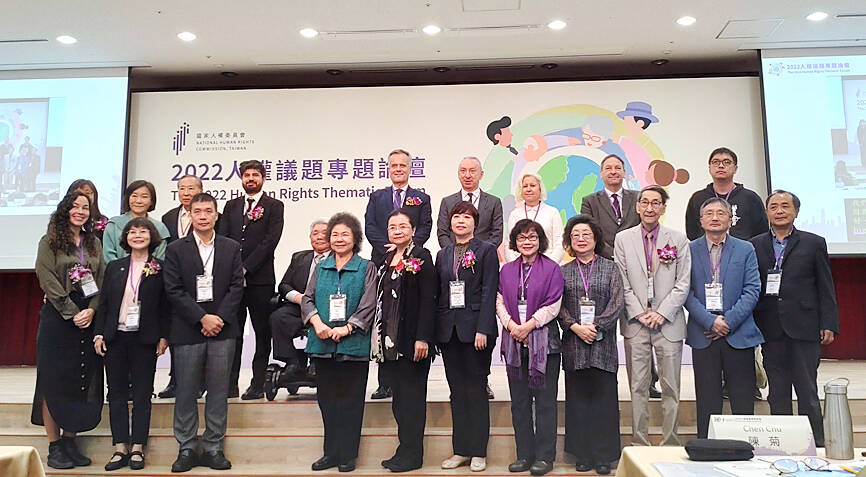Taipei should be aiming to have comprehensive engagement with the international community on human rights issues to enhance progress in Taiwan’s efforts in rights matters, National Human Rights Commission Chairwoman Chen Chu (陳菊) said yesterday at the opening of a rights forum.
This year’s edition of the commission’s Human Rights Thematic Forum began yesterday at the Chang Yung-fa Foundation’s International Convention Center in Taipei and was attended by local and international experts, discussing a wide range of topics including the rights of an aging population, national human rights institutions and how government agencies can collaborate with civic groups.
Chen said that the region’s Asia-Pacific Forum greatly assisted the commission’s establishment and significantly helped with two online sessions after it was created.

Photo: Yang Cheng-yu, Taipei Times
Since its establishment in 2020, the commission has undergone five review processes regarding Taiwan’s compliance with the International Covenant on Economic, Social and Cultural Rights, and the International Covenant on Civil and Political Rights, Chen said.
The commission has held 78 events similar to yesterday’s forum, and has interacted with more than 452 local groups on a variety of rights issues, she added.
“We must hear the voices and opinions from all sectors, and such opinions must be accorded their due respect,” Chen said.
The commission’s primary job is to bridge civic groups and the government, and ensure that Taipei can present practical policies that respond to the appeals of civic groups, she added.
Citing the UN’s 1991 Principle for Older Persons, Chen said the commission is aware that the rights of an aging population are a responsibility the government must shoulder as the percentage of the population that is older than age 65 increases rapidly.
The commission “does not represent the government,” and it aspires to become the nation’s conscience and an entity disadvantaged Taiwanese can count on, she said.
Regarding Taiwan Association for Human Rights Director-General Shih Yi-hsiang’s (施逸翔) concerns that the government was “indirectly discriminating” against people with COVID-19 by prohibiting them from voting in today’s elections, Chen said she would discuss the matter with government officials.
Shih said that while public health is an important issue, the Executive Yuan should explain its decision when voting accommodations could have been made.
The government must consider how to handle unexpected situations where human rights are suppressed, he added.
Additional reporting by Yang Cheng-yu

Chinese Nationalist Party (KMT) Chairman Eric Chu (朱立倫), spokeswoman Yang Chih-yu (楊智伃) and Legislator Hsieh Lung-chieh (謝龍介) would be summoned by police for questioning for leading an illegal assembly on Thursday evening last week, Minister of the Interior Liu Shyh-fang (劉世芳) said today. The three KMT officials led an assembly outside the Taipei City Prosecutors’ Office, a restricted area where public assembly is not allowed, protesting the questioning of several KMT staff and searches of KMT headquarters and offices in a recall petition forgery case. Chu, Yang and Hsieh are all suspected of contravening the Assembly and Parade Act (集會遊行法) by holding

PRAISE: Japanese visitor Takashi Kubota said the Taiwanese temple architecture images showcased in the AI Art Gallery were the most impressive displays he saw Taiwan does not have an official pavilion at the World Expo in Osaka, Japan, because of its diplomatic predicament, but the government-backed Tech World pavilion is drawing interest with its unique recreations of works by Taiwanese artists. The pavilion features an artificial intelligence (AI)-based art gallery showcasing works of famous Taiwanese artists from the Japanese colonial period using innovative technologies. Among its main simulated displays are Eastern gouache paintings by Chen Chin (陳進), Lin Yu-shan (林玉山) and Kuo Hsueh-hu (郭雪湖), who were the three young Taiwanese painters selected for the East Asian Painting exhibition in 1927. Gouache is a water-based

Taiwan would welcome the return of Honduras as a diplomatic ally if its next president decides to make such a move, Minister of Foreign Affairs Lin Chia-lung (林佳龍) said yesterday. “Of course, we would welcome Honduras if they want to restore diplomatic ties with Taiwan after their elections,” Lin said at a meeting of the legislature’s Foreign Affairs and National Defense Committee, when asked to comment on statements made by two of the three Honduran presidential candidates during the presidential campaign in the Central American country. Taiwan is paying close attention to the region as a whole in the wake of a

OFF-TARGET: More than 30,000 participants were expected to take part in the Games next month, but only 6,550 foreign and 19,400 Taiwanese athletes have registered Taipei city councilors yesterday blasted the organizers of next month’s World Masters Games over sudden timetable and venue changes, which they said have caused thousands of participants to back out of the international sporting event, among other organizational issues. They also cited visa delays and political interference by China as reasons many foreign athletes are requesting refunds for the event, to be held from May 17 to 30. Jointly organized by the Taipei and New Taipei City governments, the games have been rocked by numerous controversies since preparations began in 2020. Taipei City Councilor Lin Yen-feng (林延鳳) said yesterday that new measures by